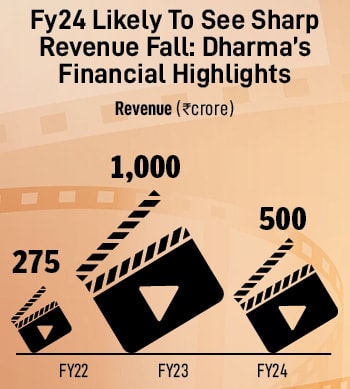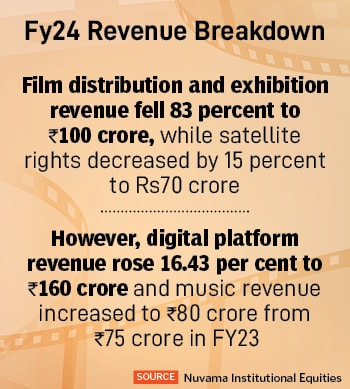 (left) Adar Poonawalla, CEO, Serum Institute of India and Karan Johar
(left) Adar Poonawalla, CEO, Serum Institute of India and Karan Johar
After weeks of speculation, Karan Johar’s Dharma Productions has sold 50 percent stake, but not to the reported bidders. While market watchers expected entertainment giants such as Saregama and Jio Cinema to be among the top contenders, in a surprise move, Johar has partnered instead with ‘close friend and innovator’ Adar Poonawalla.
Poonawalla, who is the CEO of vaccine maker Serum Institute of India, has pumped in Rs1,000 crore for 50 percent of Dharma (the combined entity, which includes the film production house Dharma Productions as well as its digital arm, Dharmatic Entertainment). Poonawalla’s stake has been bought via a company he leads called Serene Productions, believed to have been set up not long before the deal was announced.
Karan Johar as the executive chairman will spearhead the company’s creative vision, while Apoorva Mehta, in his role as the chief executive officer, will work with Johar in steering the strategic direction and overseeing the operations of the organisation.

“From its inception, Dharma Productions has been synonymous with heartfelt storytelling that captures the essence of Indian culture,” Johar says. “My father dreamed of creating films that would leave a lasting impact, and I’ve dedicated my career to expanding that vision. Today, as we join forces with Adar, a close friend and an exceptional visionary and innovator, we’re poised to elevate Dharma’s legacy to new heights. This partnership represents a perfect blend of our emotional storytelling prowess and forward-thinking business strategies.”
According to a joint statement, the strategic partnership between Serene Productions and Dharma is designed to capitalise on the Indian entertainment industry’s ‘significant expansion, driven by surging digital penetration and a diverse audience seeking high-quality content across platforms, along with growing global presence’.
 The partnership will capitalise on this evolution ‘by combining Dharma’s rich legacy in storytelling with Adar Poonawalla’s strategic acumen and resources. The collaboration aims to further transform content creation, distribution, and audience engagement by integrating advanced technologies and pioneering production methods’, the statement added.
The partnership will capitalise on this evolution ‘by combining Dharma’s rich legacy in storytelling with Adar Poonawalla’s strategic acumen and resources. The collaboration aims to further transform content creation, distribution, and audience engagement by integrating advanced technologies and pioneering production methods’, the statement added.
Talking about the partnership, Adar Poonawalla, said, “I am delighted to have the opportunity to partner with one of the most iconic production houses in our nation, along with my friend Karan Johar. We hope to build and grow Dharma and scale even greater heights in the years to come.”
Also read: Karan Johar: The man and the business behind the bling
A new era of corporatisation?
The Indian film industry, and Bollywood in particular, has been grappling with tough times in the past five years, due to Covid-19 lockdowns, the surge of OTT platforms and a shift in audience preferences, which have led to more flops at the box office.
“Adar Poonawalla’s investment signals the corporatisation of the Hindi film industry, during a tough time,” says Abneesh Roy, executive director, Nuvama Institutional Equities. “This means that the industry is moving from weaker hands to financially stronger companies. This will hopefully improve funding and lead to a more sustainable pipeline in a volatile industry, which means this is also indirectly positive for companies like PVR.”
 Apoorva Mehta, in his role as the chief executive officer, Dharma Productions
Apoorva Mehta, in his role as the chief executive officer, Dharma Productions
Roy adds that this is likely to negatively impact competing film producers and music companies such as Saregama, which was considered to be among the top bidders, and to an extent, Zee.
“This deal is being seen as a positive move, as Adar Poonawalla has the resources to give Dharma the scale it needs. Dharma will get the backing of a large conglomerate, at a time when the industry is at a ‘winner takes it all’ market phase. The movies being made are very large-budget in nature,” says Karan Taurani, senior vice president, Elara Capital.
 “Secondly, it might lead to the entry of other large conglomerates into the industry,” he adds. “We have seen our studios being backed by global studios, or by music producers such as T-series, who have dominated the market. This marks the first official entry of a conglomerate, which is good for the industry, as they can produce big-budget films.”
“Secondly, it might lead to the entry of other large conglomerates into the industry,” he adds. “We have seen our studios being backed by global studios, or by music producers such as T-series, who have dominated the market. This marks the first official entry of a conglomerate, which is good for the industry, as they can produce big-budget films.”
While other reported contenders, such as Saregama or Jio Cinema, would have brought different strategic plays to the table, this deal reads differently. “This doesn’t strategically add any value for a production house like Dharma, in terms of synergy,” Taurani says. However, it allows them to run independently, as they always have—and at the same time, will give the Poonawallas a very strong mark to start with, since Dharma is amongst the oldest and most renowned production houses in the country.”
